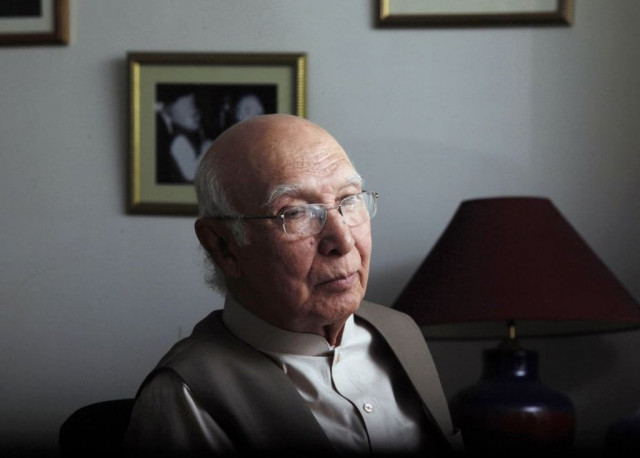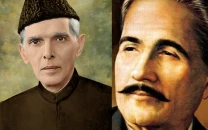Fighting terrorism: Islamabad seeks joint strategy with Kabul
Sartaj Aziz says two countries will not allow their soil to be used for attacks against each other.

Fighting terrorism: Islamabad seeks joint strategy with Kabul
Pakistan is seeking to evolve a joint strategy with the new Afghan government to control extremism and terrorism with an aim not to allow their respective territories to be used against each other, a top government aide said on Wednesday.
In a major policy statement made before the Senate Foreign Relations Committee on Wednesday, Sartaj Aziz, the prime minister’s adviser on national security and foreign affairs, spelt out the government’s foreign policy in view of the emerging political changes and strategic realignments in the region.
In terms of security and stability, he said, South Asia stands at a crossroads with elections having taken place in Bangladesh, India and Afghanistan, the recent announcement of US post-2014 military disengagement in Afghanistan, the possible Iran-US rapprochement, and the changing political and security landscape in the Gulf and Middle East region.
He said the core elements of Pakistan’s approach would remain constructive engagement, non-interference and advancement of trade, investment and economic cooperation.

Reaching out to Afghanistan
In view of the challenges, Aziz said the focus of the government’s policy would be on evolving a joint strategy with the new Afghan government to fight extremism and terrorism.
He added that the objective of this policy was to ensure that “our respective territories are not used for attacks or subversion against each other and expanding economic cooperation between Pakistan and Afghanistan”.
The statement came amid continued tensions between Islamabad and Kabul over cross-border attacks. While Afghanistan has accused Pakistan of attacking and firing shells into its territory, Islamabad on the other hand criticises Kabul for doing little to stop cross-border attacks by Taliban militants.
Pakistan is hoping that following the formation of a new government in Kabul, the two neighbours could make a new beginning.
Improving ties with India
Aziz said the government of Prime Minister Nawaz Sharif would like to carry forward the peace process with the new government in India led by Narendra Modi. Islamabad would seek to intensify the dialogue on all outstanding issues, including Kashmir, Siachen, Sir Creek and water.
He said as agreed during the meeting between the two prime ministers, the foreign secretaries would shortly hold talks to review the progress.
Strengthening ties with US
Turning to ties with Washington, Aziz said the strategic relationship with the US was being reoriented on the basis of mutual interest and mutual trust.
“The effort is to transform the substantive content of the relationship, and to change the narrative. The US is a key partner in trade and investment, counter-terrorism, and regional stability,” he said.
Aziz said Pakistan endeavoured to build on the positives while working sincerely and meaningfully to address each other’s concerns.
Improving image
Aziz said Pakistan would continue to pursue balanced relationships, and eschew involvement in issues where no direct interests are at stake. He said the barometer would be how to protect “our security and promote the agenda of peace and development.”
Published in The Express Tribune, June 26th, 2014.



















COMMENTS
Comments are moderated and generally will be posted if they are on-topic and not abusive.
For more information, please see our Comments FAQ